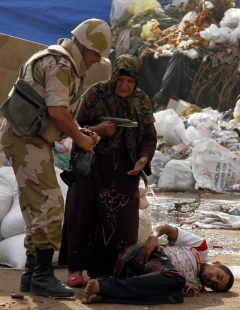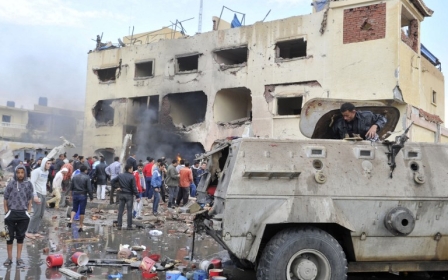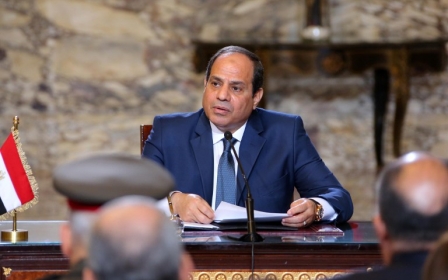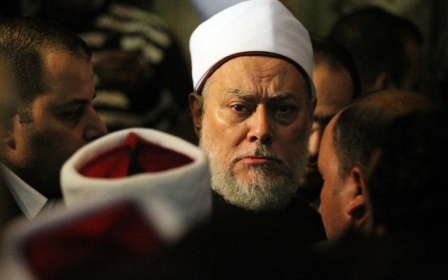Rabaa: Egypt's Scarlet Letter
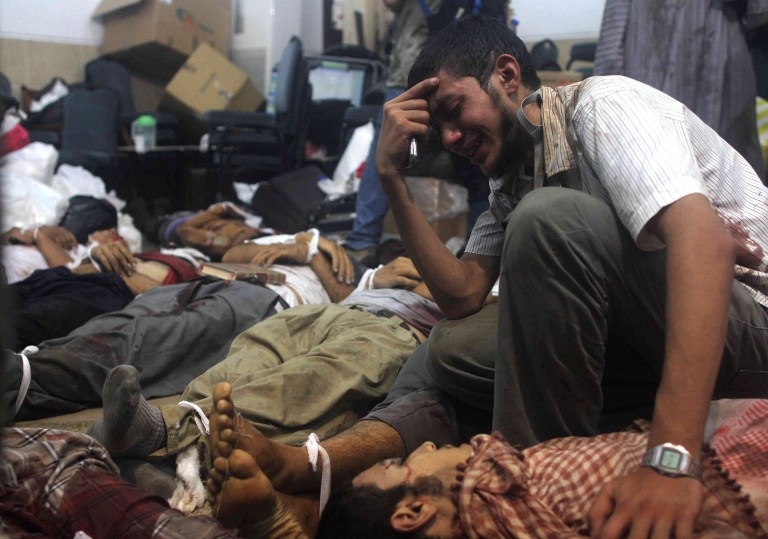
In 1850, Nathaniel Hawthorne wrote in The Scarlet Letter of an adulterous woman, who wore a scarlet red "A" – for "adulteress" - on her chest to bear her shame.
Egypt’s scarlet letter is an R, one reddened by the blood of those murdered in the Rabaa massacre that left between 817 and 1,150 Egyptians dead in its nefarious wake on a single day, three years ago.
But most people, Egyptian or otherwise, cannot even begin to fathom how Rabaa continues to kill Egypt’s prospects for a stable future and how this letter R and its roiling rivers of revenge – or in Egyptian Arabic, tha’ar - lives on.
That day, Abdul Fattah al-Sisi, defence minister at the time, along with a host of others, shredded national unity.
Millions cried, and, sadistically, millions cried for joy, in an existential contradiction that has left immovable, emotional barriers in countless Egyptian households.
Rabaa’s toll should not only be counted in dead bodies but also in myriad ways implicit and explicit that still impact Egyptian society today and beyond.
Deafening silence
I was in Cairo that forlorn summer. By late July, the coup’s punishing presence hovered over a tank-dotted landscape and subtly in conversation.
There had already been two shootouts, one on 5 July, leaving five protesters dead outside the Republican Guard Club. Three days later, a larger massacre left 61 dead. Both attacks were unjustified under any circumstances.
Many argued that it was the state’s right to assert control, a valid argument. And yet this was the unequivocal murder of protesters by armed security forces.
The public was stultifying in its refusal to acknowledge the war crimes that were being committed
Somehow, the public refused to acknowledge the war crimes that were being committed. And there was silence.
Sisi called on Egyptians to rush to the streets in the millions, in a "Sisifite" bargain to "fight terrorism". People should have been wary of how, historically, that term had been used to give cover for state terrorism, but there was no suspicion of his motives.
The regime had successfully navigated a linguistic switcheroo and managed, in less than a month, to turn the Muslim Brotherhood from rulers to public enemy number one: "terrorists". The day of 26 July, when Sisi called on protesters to support him in his fight against "terror", became the surgical knife to excise the Brotherhood from the Egyptian body politic.
Before sunrise the following morning, 95 protestors would lie dead on Nasr Road. And at approximately 6am on 14 August 2013, the evisceration began.
Important religious figures like Ali Gomaa, Egypt’s Grand Mufti, and Amr Khaled, a mega-popular religious talking head, manipulated and gave moral cover for largely uneducated troops.
"Whoever rebels" against the police or the army "deserves to be killed according to Sharia," shrieked Gomaa.
In the eyes of the soldiers, this was license to kill. And kill they did.
The killing machine
Short of outright civil war, this was an unmitigated disaster; the numbers, to this day, remain debatable, but the most frequently quoted death toll figure is approximately 1,000, with nearly three times as many injured.
Vengeful embers have been sparking at the fabric of Egyptian society ever since, leading the country into an even more dangerous phase.
Five days after Rabaa, militants executed 25 conscripts in Rafah, the first revenge attack. Just this month, on 5 August, there was an assassination attempt on the very same Gomaa.
The attempt failed, but it didn’t for Hisham Barakat, the national prosecutor who sent thousands of Islamists to jail post-coup, who was killed by a bomb blast last June. A month earlier, hours after Morsi was sentenced to death, three judges were assassinated by militant bullets on the road in Sinai.
An unexploded bomb
But there is more than revenge at play. A foreign concept to the Western mind, tha’ar, loosely translated, means revenge, hence the scarlet R, but mixed into its meaning are elements of blood and honour.
Once blood has been shed, honour has been defiled, and the thirst for revenge has no time limit. This is why Rabaa is an unexploded bomb.
Revenge burns everyone - and so it will be with Egypt when the time of reckoning comes
Mohamed Khan, one of the Egypt’s preeminent film directors who died last month, understood the destructive power of tha’ar and, accordingly, gave one of his earlier works that title.
The film, an Egyptian adaptation of Charles Bronson’s Death Wish, tells the story of an Egyptian woman, early in her pregnancy, who is raped by three men and whose husband spends the remainder of the movie chasing down the rapists. Enflamed by his passion, the irrational and machismo-driven husband only realises in the very last scene that he has killed the wrong men.
While by no means Khan’s best production, the film encapsulates how revenge burns everyone involved. And so it will be with Egypt when the time of reckoning comes knocking on national doors.
Gas to fire
So engrained is tha’ar in the national psyche that when the Egyptian army hit the Islamic State group in Libya last February in retaliation for the beheading of 21 Egyptians, the term used by the army was also used the world over: “Egypt avenges mass beheadings.” In Sinai, security forces use the very same language.
So it stands to reason that Sisi’s inner circle is not blind to tha’ar as a major consequence of the Rabaa massacre. At the molten rock level, the chief propagator of violence is tha’ar.
Entrenched within its vengeful bunker are tens of thousands of Egyptian families who had relatives murdered, injured, jailed and sentenced to death. That does nothing but add gasoline to a complex societal fire. Many are to blame, but Sisi’s name is at the head of that very long list.
Yet another casualty of the massacre has been the rolling back of the most powerful weapon Egyptians gained in 2011: the right to demonstrate.
The instant liberals, and a majority of those whose allegiance is revolutionary, and progressives went silent as the right of Islamists to demonstrate were suppressed in the deadly onslaught during and after Rabaa; the stage was set for the Protest Law.
With the exception of a small minority who spoke up from day one, most Egyptians wear the red R
Dictatorships such as Sisi’s fully comprehend the complicity of silence, that deafening power which German Protestant pastor Martin Niemoller described in his famous poem that sees different groups taken away by the Nazis because no one would speak out.
Indeed, they came first for the Islamists. Armed with a devastating weapon like the Protest Law, they came next after the revolutionary camp. So damaging was the attack, one publication argued that it brought the revolution down.
Since those initial heydays of Sisi’s iron clamp, Egypt’s prisons have burst at the seams with well in excess of 52,000 political prisoners – 41,000 as of April 2014 and at least an additional 11,787 admitted by Ministry of the Interior by last October.
With the exception of a small minority who spoke up from day one, most Egyptians wear the red R.
Fascism unfurled
A third element in the trilogy of shame uncovered by Rabaa with invisible, but nation-destroying, repercussions: the uncovering of the fascist within many an Egyptian.
Egyptians didn’t wake up on 3 July 2013 to discover that they were greenlighting blatant war crimes. That readiness was crystal clear during the Morsi tenure when four Shias were slaughtered in an Egyptian village.
An unwillingness to accept the other, whether they be women, Copt, Islamist, Bahai, Shia, atheist or gay is, despite mainstream arguments to the contrary, tragically, ineradicably entrenched within the national fibre.
Many blamed, and rightfully so, Morsi for an exclusionary rhetoric that left many Egyptians outside the tent.
Sisi, however, with the majority of the nation following in lock step, has driven the cartwheel off the cliff. Once you no longer accept the other as an equal with equal rights, the proverbial negotiating table is at risk of becoming dust in history’s unforgiving winds.
One must ponder the contradictions of a man who says "you are the light of my eye" while simultaneously giving orders to extinguish Egyptian lives.
Remember Rabaa today, but do something about it tomorrow.
- Amr Khalifa is a freelance journalist and analyst recently published in Ahram Online, Mada Masr, The New Arab, Muftah and Daily News Egypt. You can follow him on Twitter@cairo67unedited.
The views expressed in this article belong to the author and do not necessarily reflect the editorial policy of Middle East Eye.
Photo: A man grieves as he looks at one of many bodies laid out in a make shift morgue after Egyptian security forces stormed two huge protest camps at the Rabaa al-Adawiya and Al-Nahda squares where supporters of ousted president Mohamed Morsi were camped, in Cairo in August 2013 (AFP)
Stay informed with MEE's newsletters
Sign up to get the latest alerts, insights and analysis, starting with Turkey Unpacked
Middle East Eye delivers independent and unrivalled coverage and analysis of the Middle East, North Africa and beyond. To learn more about republishing this content and the associated fees, please fill out this form. More about MEE can be found here.



